|
|
|
Sort Order |
|
|
|
Items / Page
|
|
|
|
|
|
|
| Srl | Item |
| 1 |
ID:
094537
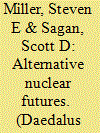

|
|
|
| 2 |
ID:
162360
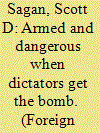

|
|
|
| 3 |
ID:
121096


|
|
|
|
|
| Publication |
2013.
|
| Summary/Abstract |
How strong are normative prohibitions on state behavior? We examine this question by analyzing anti-nuclear norms, sometimes called the "nuclear taboo," using an original survey experiment to evaluate American attitudes regarding nuclear use. We find that the public has only a weak aversion to using nuclear weapons and that this aversion has few characteristics of an "unthinkable" behavior or taboo. Instead, public attitudes about whether to use nuclear weapons are driven largely by consequentialist considerations of military utility. Americans' willingness to use nuclear weapons increases dramatically when nuclear weapons provide advantages over conventional weapons in destroying critical targets. Americans who oppose the use of nuclear weapons seem to do so primarily for fear of setting a negative precedent that could lead to the use of nuclear weapons by other states against the United States or its allies in the future.
|
|
|
|
|
|
|
|
|
|
|
|
|
|
|
|
| 4 |
ID:
090189
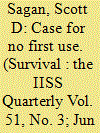

|
|
|
|
|
| Publication |
2009.
|
| Summary/Abstract |
In his 5 April 2009 speech in Prague, US President Barack Obama promised that 'to put an end to Cold War thinking, we will reduce the role of nuclear weapons in our national security strategy and urge others to do the same'. The forthcoming Nuclear Posture Review (NPR), mandated by Congress, provides the administration an opportunity to honour that commitment. To reduce the role of nuclear weapons in national security strategy, however, the next NPR must abandon the long-standing US policy of threatening to use its nuclear weapons first in a variety of military scenarios. This basic step was not taken in the George W. Bush administration's 2001 NPR, despite its claim to institute 'a major change in our approach to the role of nuclear offensive forces in our deterrent strategy' and call to 'both reduce our dependence on nuclear weapons and improve our ability to deter attack in the face of proliferating [weapons of mass destruction (WMD)] capabilities'. Indeed, the 2001 NPR contradicted these stated ambitions by maintaining that nuclear weapons were still necessary to 'provide credible military options to deter a wide range of threats, including WMD and large-scale conventional military force'.
|
|
|
|
|
|
|
|
|
|
|
|
|
|
|
|
| 5 |
ID:
151756
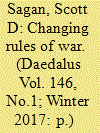

|
|
|
| 6 |
ID:
175081
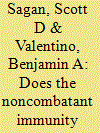

|
|
|
| 7 |
ID:
147552
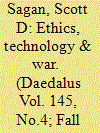

|
|
|
| 8 |
ID:
151758
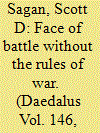

|
|
|
|
|
| Summary/Abstract |
This essay analyzes the extraordinary drawings of Red Horse, a Minneconjou warrior who fought at the 1876 Battle of the Little Bighorn, to provide insights into what warfare was like without just war doctrine or the laws of armed conflict to place constraints on violence. The artist's candid vision of the battle and its aftermath portrays the indiscriminant brutality of the Great Sioux War, the disrespect given to a hated enemy, and the lingering desire for revenge. But the drawings also reveal the pride of victory and the trauma of defeat. In addition to providing a window into the past, the Red Horse drawings provide a lens to help us understand the atrocities committed by the Islamic State and Al Qaeda today and a mirror that can help us more clearly see ourselves.
|
|
|
|
|
|
|
|
|
|
|
|
|
|
|
|
| 9 |
ID:
127573
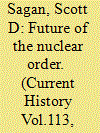

|
|
|
|
|
| Publication |
2014.
|
| Summary/Abstract |
Scholars should be modest when making predictions about the future of nuclear weapons. After all, pundits, professors, and presidents alike have made radically inaccurate nuclear predictions in the past. "In that terrible flash 10,000 miles away," the journalist James Reston wrote in The New York Times
immediately after Hiroshima and Nagasaki, "men here have not only seen the fate of Japan, but have glimpsed the future of America." A group of Manhattan Project scientists similarly argued, "The whole history of mankind teaches . . . that accumulated weapons of mass destruction 'go off' sooner or later, even if this means a senseless mutual destruction." Yet the United States has not used nuclear weapons in combat since 1945 despite many opportunities to do so during Cold War crises, in Korea and Vietnam, or during the 1991 Gulf War against Iraq.
|
|
|
|
|
|
|
|
|
|
|
|
|
|
|
|
| 10 |
ID:
073509
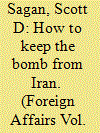

|
|
|
|
|
| Publication |
2006.
|
| Summary/Abstract |
The debate over how to deal with Iran's nuclear program is clouded by historical amnesia. Nuclear proliferation has been stopped before, and it can and should be stopped in this case as well. Unfortunately, with Tehran -- as with some of its predecessors -- the price for Washington will be relinquishing the threat of regime change by force.
|
|
|
|
|
|
|
|
|
|
|
|
|
|
|
|
| 11 |
ID:
094192
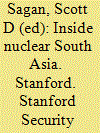

|
|
|
|
|
| Publication |
Stanford, Stanford Security Studies, 2009.
|
| Description |
x, 281p.
|
| Standard Number |
9780804762380
|
|
|
|
|
|
|
|
|
|
|
|
Copies: C:1/I:0,R:0,Q:0
Circulation
| Accession# | Call# | Current Location | Status | Policy | Location |
| 054808 | 355.02170954/SAG 054808 | Main | On Shelf | General | |
|
|
|
|
| 12 |
ID:
102394
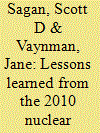

|
|
|
|
|
| Publication |
2011.
|
| Summary/Abstract |
The case studies in this special issue demonstrate that the Obama administration's 2010 Nuclear Posture Review (NPR) and related nuclear policy initiatives encouraged a number of other nuclear weapon states to likewise reduce the role of nuclear weapons in their national security doctrines and helped pave the way with non-nuclear weapon states for a successful 2010 Review Conference of the Treaty on the Non-Proliferation of Nuclear Weapons. This article reviews the contributing authors' case study findings regarding key foreign governments that applauded the 2010 NPR and were receptive to President Barack Obama's vision of a world free of nuclear weapons as well as governments that remained skeptical about US disarmament and arms control initiatives. We conclude with an analysis of the lessons that should be learned from the 2010 NPR process: the need for consistent implementation of changes in nuclear weapons doctrine, improved coordination and consultation with allies and other states, and further global education about the likelihood and consequences of nuclear terrorism.
|
|
|
|
|
|
|
|
|
|
|
|
|
|
|
|
| 13 |
ID:
055725
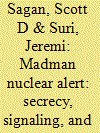

|
|
|
| 14 |
ID:
111131
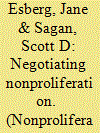

|
|
|
|
|
| Publication |
2012.
|
| Summary/Abstract |
In nuclear nonproliferation negotiations, many governments pursue multiple objectives, and changes in policy can occur rapidly-and often unexpectedly. For these reasons, understanding nonproliferation requires empathy and imagination rather than just historical fact. This article considers one teaching tool to encourage such insight-simulations-and demonstrates how teaching and scholarship can interact to improve our understanding of the complex decisions and negotiations involved in nuclear nonproliferation. The article consists of five parts: first, it explains the benefits of simulations as both a policy development tool in Washington and as a teaching tool in universities; second, it describes the pedagogical strategy of the Stanford University simulation program; third, it shows how the simulations have identified and highlighted theoretical and substantive insights that are often neglected in scholarly studies of nonproliferation; and fourth, it describes how students are tested to enhance the learning experience from the simulation. Fifth and finally, the article provides concluding observations about how using simulations in the classroom can help scholars develop insights that improve their understanding of real-world nuclear negotiation dynamics and outcomes.
|
|
|
|
|
|
|
|
|
|
|
|
|
|
|
|
| 15 |
ID:
161428
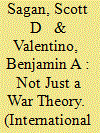

|
|
|
|
|
| Summary/Abstract |
In this article we assess American public attitudes toward the just war principles of proportionality, due care and distinction. Consistent with the logic of proportionality, we find that Americans are less willing to inflict collateral deaths on foreign civilians when the military advantage of destroying a target is lower. Most Americans also are willing to risk the deaths of American soldiers to avert a larger number of collateral foreign civilian deaths, which accords with the due care principle. Nevertheless, we find that the public's commitments to proportionality and due care are heavily biased in favor of protecting American soldiers and promoting US national security interests. Moreover, we find little evidence that the majority of the public supports the principle of noncombatant immunity, and, contrary to just war doctrine, Americans are more likely to accept collateral deaths of foreign civilians when those civilians are described as politically sympathetic with the adversary.
|
|
|
|
|
|
|
|
|
|
|
|
|
|
|
|
| 16 |
ID:
147557
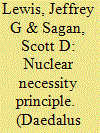

|
|
|
|
|
| Summary/Abstract |
In 2013, Obama administration spokesmen stated that all U.S. nuclear war plans “apply the principles of distinction and proportionality and seek to minimize collateral damage to civilian populations and civilian objects.” We analyze U.S. nuclear policy documents and argue that major changes must be made if U.S. nuclear war plans are to conform to these principles of just war doctrine and the law of armed conflict. We propose that the U.S. president announce a commitment to a “principle of necessity,” committing the United States not to use nuclear weapons against any military target that can be destroyed with reasonable probability of success by a conventional weapon. Such a doctrinal change would reduce collateral damage from any nuclear strike or retaliation by the United States and would, we argue, make our deterrent threats more credible and thus more effective.
|
|
|
|
|
|
|
|
|
|
|
|
|
|
|
|
| 17 |
ID:
091920
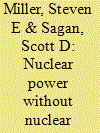

|
|
|
| 18 |
ID:
087450
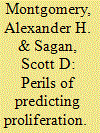

|
|
|
|
|
| Publication |
2009.
|
| Summary/Abstract |
Studies of nuclear proliferation share five serious problems. First, nuclear programs' initiation and completion dates are ambiguous and difficult to code, but findings are rarely subjected to sufficient robustness tests using alternative codings. Second, independent variables overlook important factors such as prestige and bureaucratic power and often use poor proxies for concepts such as the nonproliferation regime. Third, methodologies and data sets should be tightly coupled to empirical questions but are instead often chosen for convenience. Fourth, some findings provide insights already known or believed to be true. Fifth, findings can ignore or gloss over data crucial for policy making and wider debates. This article reviews new quantitative research on nuclear proliferation, noting improved analysis and lingering problems. It highlights the 1999 Kargil war to explore dangers of relying on stock data sets and the need for research on statistical outliers. It concludes with a future research agenda aimed at correcting problems and a cautionary note regarding hasty application of quantitative results to policy making.
|
|
|
|
|
|
|
|
|
|
|
|
|
|
|
|
| 19 |
ID:
102382
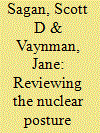

|
|
|
|
|
| Publication |
2011.
|
| Summary/Abstract |
The Obama administration has argued that its efforts to reduce the role of nuclear weapons in US defense policy and work toward "a world free of nuclear weapons" will encourage other governments to strengthen the nuclear nonproliferation regime and support global nuclear disarmament. Does the evidence support this assertion? This essay describes the changes in US nuclear weapons and disarmament policies initiated by the Obama administration and outlines four potential pathways through which the United States might influence other governments' policies: by reducing nuclear threat perceptions, by changing global beliefs about what constitutes "responsible" nuclear behavior, by impacting domestic debates about disarmament in foreign capitals, and by creating new diplomatic negotiation dynamics.
|
|
|
|
|
|
|
|
|
|
|
|
|
|
|
|
| 20 |
ID:
153631


|
|
|
|
|
| Summary/Abstract |
Numerous polls demonstrate that U.S. public approval of President Harry Truman's decision to drop the atomic bombs on Hiroshima and Nagasaki has declined significantly since 1945. Many scholars and political figures argue that this decline constitutes compelling evidence of the emergence of a “nuclear taboo” or that the principle of noncombatant immunity has become a deeply held norm. An original survey experiment, recreating the situation that the United States faced in 1945 using a hypothetical U.S. war with Iran today, provides little support for the nuclear taboo thesis. In addition, it suggests that the U.S. public's support for the principle of noncombatant immunity is shallow and easily overcome by the pressures of war. When considering the use of nuclear weapons, the majority of Americans prioritize protecting U.S. troops and achieving American war aims, even when doing so would result in the deliberate killing of millions of foreign noncombatants. A number of individual-level traits—Republican Party identification, older age, and approval of the death penalty for convicted murderers—significantly increase support for using nuclear weapons against Iran. Women are no less willing (and, in some scenarios, more willing) than men to support nuclear weapons use. These findings highlight the limited extent to which the U.S. public has accepted the principles of just war doctrine and suggest that public opinion is unlikely to be a serious constraint on any president contemplating the use of nuclear weapons in the crucible of war.
|
|
|
|
|
|
|
|
|
|
|
|
|
|
|
|
|
|
|
|
|